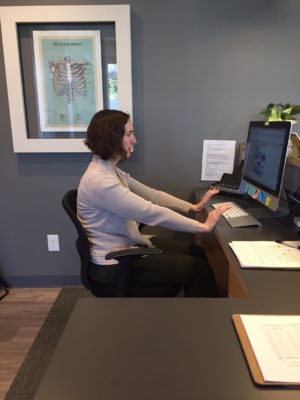Breathing. We do it every single day. It is a somewhat passive, reflexive, and innate muscle behavior. On average, we take 12-20 breaths per minute, adding up to about 36,000 breaths per day. So, it is vital that we have a diaphragm that works well! The diaphragm is a big muscle that influences and is is influenced by our body posture, dynamic activities, and daily life stressors. The diaphragm function can become a problem if any of these factors cause a change in it’s operation. For example, poor posture while sitting at your desk at work or driving in your car can cause the diaphragm to become flattened, not allowing for proper inhalation or exhalation (contraction and relaxation).
Ever wonder why your low back or mid back hurts after sitting for an 8 hour work day? Your spine becomes patterned or locked into one postural behavior, and the rib cage loses it’s ability to expand and contract with the breath. Your back muscles now tighten up and cause compression, which can be painful after working 8 hours a day! Ever wonder why your neck hurts or is tense after your daily run? If the diaphragm muscle isn’t functioning correctly, your neck muscles may have to ‘take over’ to help your ribs move to get air in your tank.
Try this exercise that may help assist with reducing your pain or stiffness while sitting at your desk or before/after your daily run to make sure your diaphragm can do all that it is intended to do:
- Sit at your desk with both feet fully in contact with the floor, mid back in contact with the back of your chair
- Gently press your hands into the desk in front of you, feeling your muscles under your armpits engage. Your shoulders should not be shrugged as you do this.
- Hold the gentle hand press and inhale very slowly, feeling the mid back and chest expand without the shoulders shrugging. The inhale can last 5 seconds.
- Slowly, and fully exhale until you have all the breath out. You should feel your abdominals turn “on” near the end of your exhale. The exhale can last up to 7 seconds.
- Slowly, repeat this sequence 4-5 breaths. Perform every hour for your work day.

For more tips and techniques for improving diaphragm function, schedule today with Mobilize Physical Therapy www.mobilizept.com

